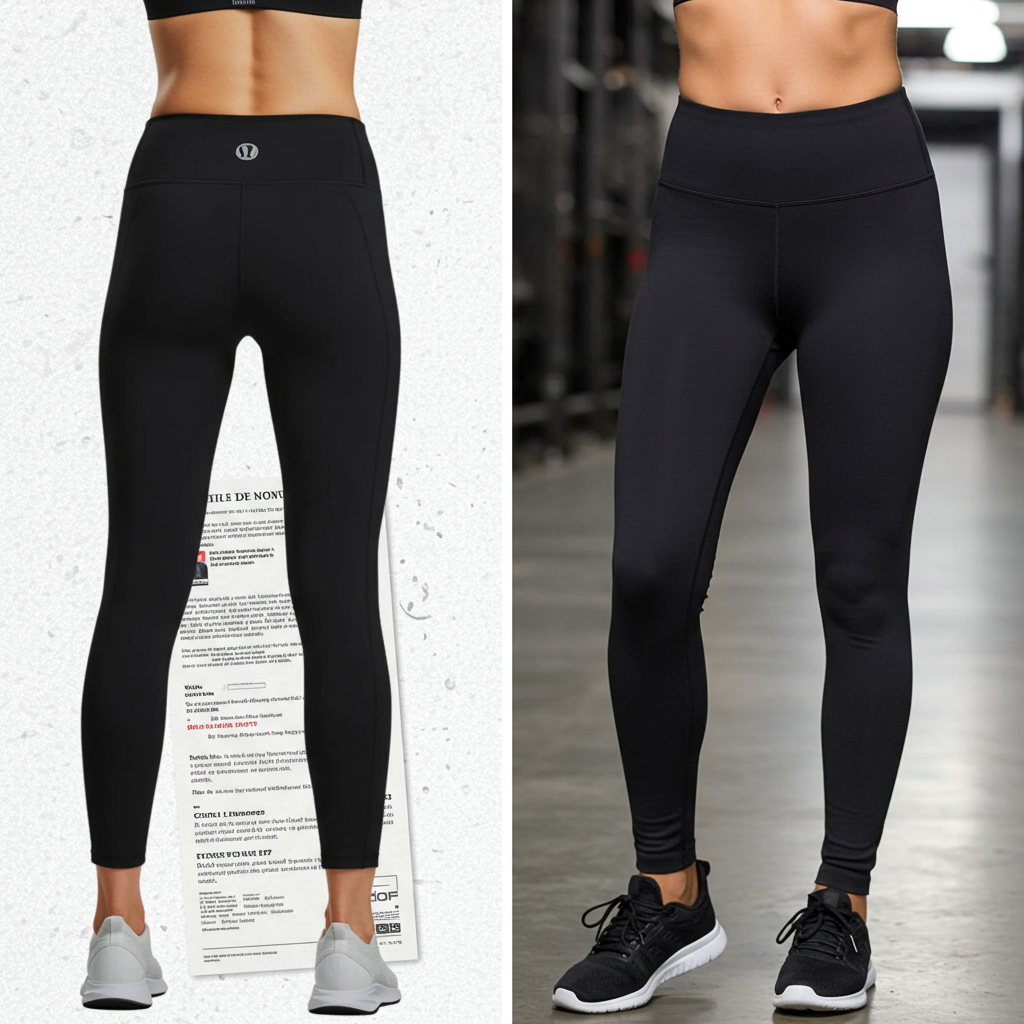Premium athleisure giant lululemon Athletica is taking on warehouse retail behemoth Costco Wholesale Corp. in a high-stakes legal battle. Lululemon has filed a lawsuit alleging that Costco is selling unauthorized, lookalike versions—often dubbed “dupes” by consumers—of its popular and often expensive apparel, including its signature $128 pants. The core of the accusation? Costco is unfairly capitalizing on lululemon’s hard-earned reputation and design investments by offering strikingly similar products under its own Kirkland Signature label at a fraction of the cost, allegedly confusing shoppers.
The lawsuit, filed in the U.S. District Court for the Central District of California, lays bare Lululemon’s claims of intellectual property infringement. It accuses Costco of violating Lululemon’s trademarks and design patents. According to the complaint, Costco’s actions constitute “unlawfully traded” on Lululemon’s significant “reputation, goodwill and sweat equity.” This legal challenge highlights the growing tension between established premium brands and discounters in the era of viral “dupes.”
The Heart of the Lawsuit: Allegations Against Costco
Lululemon’s complaint centers on specific product lines where it alleges Costco is selling infringing apparel. These include the highly popular men’s ABC (Anti-Ball Crushing) pants, known for their comfort and stretch. The lawsuit also targets the fitted athletic Define jackets and the oversized Scuba zip-ups and hoodies. Lululemon contends that Costco’s private-label line, Kirkland Signature, is featuring these similar items.
A significant focus of the lawsuit is the alleged consumer confusion caused by Costco’s sales. Lululemon asserts that by selling these near-identical products, Costco misleads customers. Consumers might believe the Kirkland-branded items are authentic Lululemon products. They could also think they are manufactured by Lululemon or produced by the same trusted suppliers. Lululemon explicitly states that a primary goal of selling these “dupes” is to confuse shoppers, either at the point of purchase or later.
Comparing the Products and Prices
The lawsuit reportedly includes detailed comparisons of the designs. It shows the alleged similarities between Lululemon’s authentic products and the Costco alternatives. Crucially, it highlights vast price discrepancies. For example, Lululemon’s ABC men’s pants retail for $128. The lawsuit alleges Costco is selling a comparable pair for only about $10.
The Scuba hoodie, a Lululemon staple, typically sells for $118. The lawsuit points to a Costco version allegedly selling for as low as approximately $8, although some reports suggest the price might be closer to $20. Regardless of the exact Costco price, the difference is dramatic. Lululemon argues that offering cheap lookalikes at such low price points significantly damages its brand value and market position.
Lululemon’s Stance and Legal Strategy
Lululemon portrays itself as an “innovation-led company.” It emphasizes its substantial investment in research, development, and design for its products. Protecting these investments and enforcing its intellectual property rights is a top priority, according to the company. Lululemon stated it takes this responsibility very seriously and pursues legal action when necessary.
Through the lawsuit, Lululemon aims to “fully recover” its financial losses attributed to Costco’s alleged actions. It is seeking an unspecified amount of monetary damages. Furthermore, Lululemon is asking the court to issue an order. This order would compel Costco to immediately stop selling the products in question. Lululemon claims it attempted to resolve the issue beforehand. The company reportedly sent a letter to Costco in November 2024 regarding alleged Scuba design infringement. It also mentioned sending cease and desist letters to companies selling alleged knockoffs prior to filing suit on June 27.
The Broader Context: ‘Dupes,’ Competition, and Economic Headwinds
The lawsuit unfolds within a broader retail trend: the rise of “dupes.” These are more affordable products that closely resemble popular, higher-priced items from premium brands. The popularity of “dupes” has surged, particularly on social media platforms. Consumers are actively seeking budget-friendly alternatives amidst rising living costs and economic uncertainty. This trend presents a significant challenge for brands like Lululemon. These companies invest heavily in unique design innovation and cultivating a strong brand identity. While the trend caters to consumers prioritizing affordability, Lululemon’s lawsuit highlights the risk. It claims customers can be misled into believing they are buying authentic goods.
This legal action also comes at a challenging time for Lululemon. The company recently lowered its financial outlook for the full year. It cited a “dynamic macroenvironment” as a factor. This includes a reported decline in visits to its U.S. stores. Added costs from tariffs are also impacting its business. Furthermore, Lululemon faces increasing competition in the athleisure market. Brands like Vuori and Alo are gaining market share. Lululemon’s shares have reflected these pressures, reportedly down significantly for the year, around 36-37%.
A History of Defending Its Brand
This isn’t the first time Lululemon has resorted to legal action to protect its designs. In 2021, the company sued stationary bike giant Peloton. Lululemon alleged that Peloton was making and selling apparel with similar-looking designs. That particular lawsuit was settled in 2022. Following the resolution, the two companies even announced a five-year partnership. This history underscores Lululemon’s willingness to pursue legal means to defend its intellectual property against perceived infringement.
What Happens Next? Potential Implications
Costco has reportedly declined to comment publicly on the lawsuit thus far. The case is now before the U.S. District Court for the Central District of California. Lululemon is demanding a jury trial. The outcome of this legal battle could have significant implications. For Lululemon, a win could result in substantial monetary damages and an injunction stopping Costco from selling the disputed items. It could also set a precedent. A ruling in favor of Lululemon could strengthen design patent and trademark protection for premium brands. This might limit the availability of close lookalikes in the market. Conversely, if the court denies Lululemon’s claims, it could potentially embolden discount retailers. It might allow them to continue offering affordable alternatives that closely resemble brand-name products.
Frequently Asked Questions
What is Lululemon accusing Costco of selling?
Lululemon is accusing Costco of selling unauthorized and unlicensed “dupes” or knockoff versions of its premium athleisure wear. Specifically, the lawsuit targets items like Lululemon’s men’s ABC pants, Define jackets, and Scuba hoodies and zip-ups. Lululemon claims these are similar designs sold under Costco’s Kirkland Signature private label at much lower prices.
Why is Lululemon suing Costco over these products?
Lululemon alleges that by selling these lookalike products, Costco is infringing on Lululemon’s intellectual property rights, including trademarks and design patents. Lululemon also claims Costco is unfairly trading on its brand reputation and confusing consumers into believing the “dupes” are authentic Lululemon products or are associated with the brand.
What does Lululemon hope to achieve with this lawsuit?
Lululemon is seeking to recover financial losses incurred due to Costco’s alleged actions, requesting unspecified monetary damages. Additionally, the company is asking the court to issue a permanent order or injunction. This order would legally require Costco to stop selling the specific products that Lululemon claims infringe upon its designs and intellectual property.
This lawsuit highlights the ongoing tension between brand value, intellectual property rights, and consumer demand for affordable alternatives in the competitive retail landscape. The case’s resolution will be closely watched by players across the fashion and retail industries.
Word Count Check: 930




